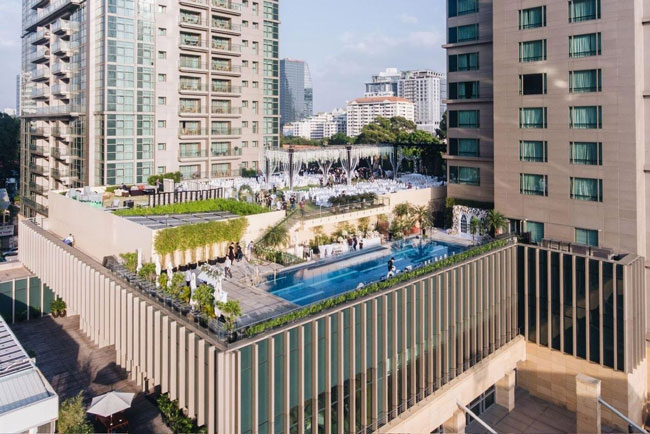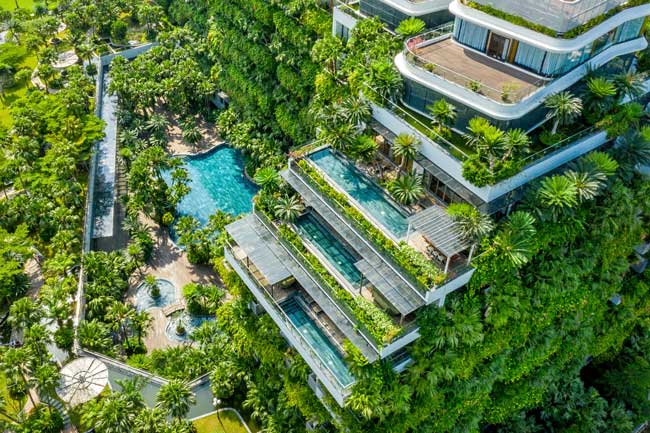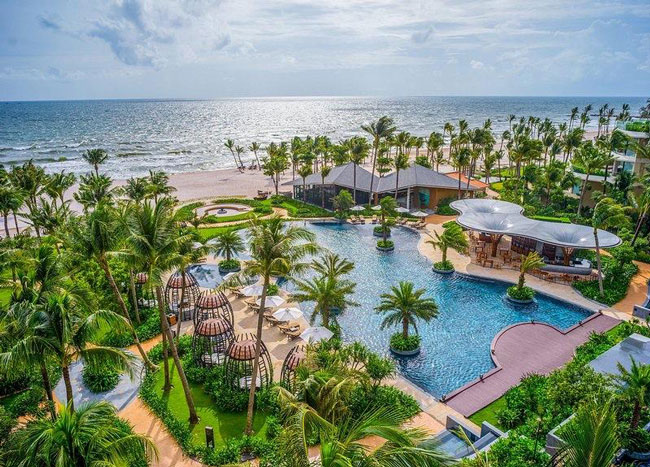Vietnam has emerged as a promising tourism and investment destination in Southeast Asia. With its rich cultural heritage, stunning natural landscapes, dynamic cities, and rapidly expanding middle class, the country is increasingly attracting high-end travellers and international investors. In this context, developing 5-star hotels presents an attractive pathway, yet one that comes with a range of challenges.

Advantages for 5-Star Hotel Development
Vietnam has consistently recorded high growth in both international and domestic tourism. Before the COVID-19 pandemic, in 2019, the country welcomed over 18 million international visitors. After reopening in 2022, tourism recovered swiftly, thanks to strong visitor flows from South Korea, China, and Europe. In 2024, Vietnam’s tourism sector reached nearly 17.6 million international arrivals and 110 million domestic trips. Demand for luxury experiences is increasingly evident in destinations such as Hanoi, Ho Chi Minh City, Da Nang, Phu Quoc, and Ha Long.
At the same time, the growing domestic middle and upper class is becoming a key driver of luxury consumption. More high-income Vietnamese are seeking world-class hotel services, especially at resorts or getaways near major cities for weekend leisure.
Vietnam also offers favourable policies encouraging foreign direct investment in tourism and hospitality infrastructure, including tax incentives, administrative support, and public-private partnership frameworks. In some regions, priority licensing is available for key tourism projects.

Moreover, compared to countries like Singapore or Thailand, Vietnam still benefits from relatively lower land, labour, and material costs, offering a cost advantage for both initial investment and operational expenses. Vietnamese people are known for their hospitality, making it easier to recruit and train a high-quality service workforce at reasonable costs.
Lastly, Vietnam boasts a diverse natural and cultural ecosystem from Sapa’s mountains, Da Nang’s beaches, and Phu Quoc’s islands, to the vibrant cities of Hanoi and Ho Chi Minh City, all offering ideal settings for 5-star hotels and a strong foundation for luxury tourism development with local cultural immersion.
Challenges in Developing 5-Star Hotels
First, 5-star hotels require substantial capital investment. Meeting international standards in construction, selecting a management brand, and using high-end interior and equipment can significantly increase the initial capital requirements. Second, while Vietnam has made strides in administrative reform, procedures related to land, environmental impact assessments, and construction permits remain complex, particularly for foreign investors.
Additionally, in emerging tourism areas, infrastructure such as roads, utilities, and waste treatment systems remain underdeveloped, raising investment costs and affecting guest experiences.
On the human capital side, the 5-star segment demands professional staff with foreign language proficiency and high standards in service and management. Vietnam still faces a shortage of experienced personnel trained in international luxury hospitality environments. Uneven local training quality and the ongoing "brain drain" to more developed markets further aggravate this issue. As a result, developers often face higher operating costs due to the need for training or hiring foreign experts.
Furthermore, operating a 5-star hotel demands strict adherence to global standards and strong branding. Global hotel giants like Marriott International, Accor SA, and InterContinental Hotels Group have already entered the Vietnamese market, bringing capital, experience, and international management ecosystems, intensifying competition, particularly for domestic hotel brands. Destinations like Da Nang, Nha Trang, and Phu Quoc are showing signs of oversupply in the 5-star category, leading to pricing pressures. Coastal and northern regions are also more vulnerable to weather-related seasonality.

Strategies for Optimising 5-Star Hotel Development
1. Differentiate the destination
Developers should target locations with unique storytelling potential, such as lakeside resorts, indigenous architecture, or wellness retreats. Oversaturated markets should be avoided unless there is a clear competitive edge.
2. Partner with strong brands
Collaborating with reputable international brands ensures operational standards, attracts loyal clientele, and enhances the ability to secure funding.
3. Prioritise human resource development
Early investment in workforce training via partnerships with international hospitality schools or in-house programmes is crucial to delivering premium service.
4. Adopt sustainable design and smart technologies
Green design, energy efficiency, use of local materials, and smart systems not only improve the guest experience but also reduce operating costs and appeal to eco-conscious travellers.
5. Combine with branded residences
Integrating branded residences with hotel operations can enhance financial performance and attract affluent individual investors, both domestic and international.
6. Strengthen public-private partnerships
Early collaboration with local authorities in planning, legal procedures, and destination marketing is key to long-term project success.
7. Mitigate seasonality
Hosting wellness events, retreats, workshops, and conferences during low seasons can help stabilise occupancy and diversify the customer base.
8. Incorporate cultural identity into guest experience
Both international and domestic guests value unique local elements in cuisine, architecture, or storytelling. Integrating cultural features into design and services strengthens brand loyalty and enhances guest satisfaction.
In summary, the 5-star hotel segment in Vietnam presents immense opportunities but also significant challenges. Success will depend on strategic vision, smart destination choices, suitable brand partnerships, and the ability to balance international standards with local identity. With the right direction, Vietnam can position itself as one of Southeast Asia’s most attractive markets for luxury hospitality, provided it fully leverages its natural potential and accelerates reforms in infrastructure, workforce development, and investment policy. With a clearly different offering from Thailand and Singapore, Vietnam has the chance to carve out its niche as a premium destination combining leisure, culture, and wellness, an increasingly sought-after experience among both international visitors and the growing domestic upper-middle class.
Trang Duong
Co-founder of Rubix International
Expert in hotel development and management